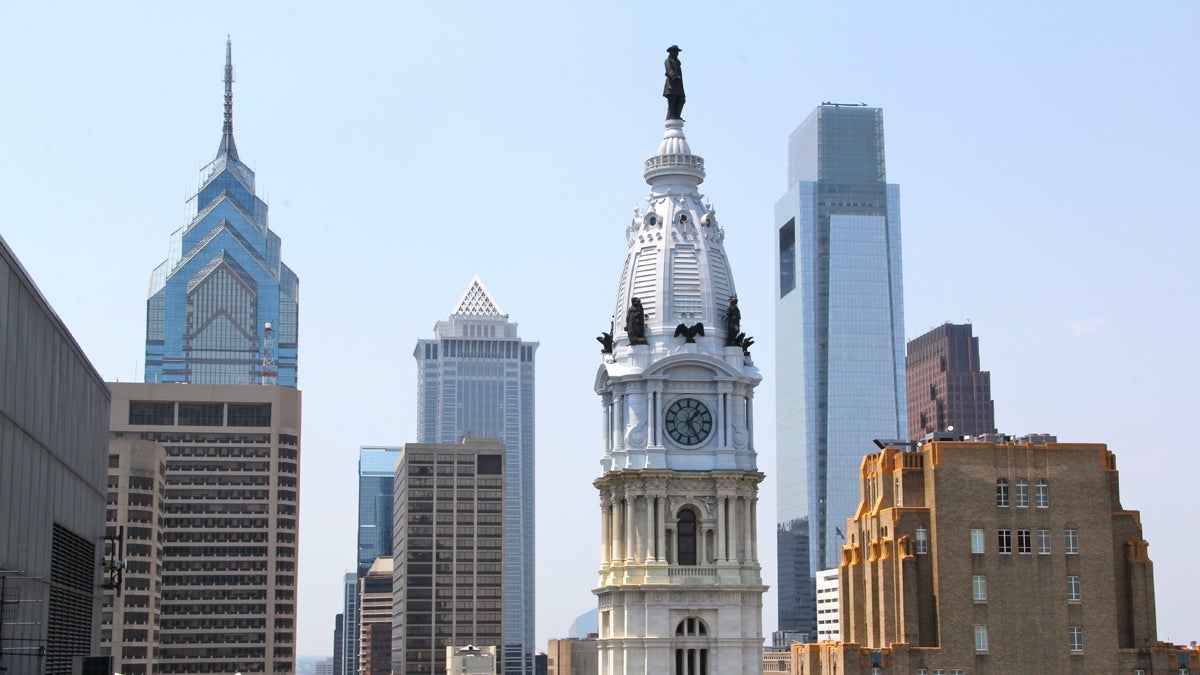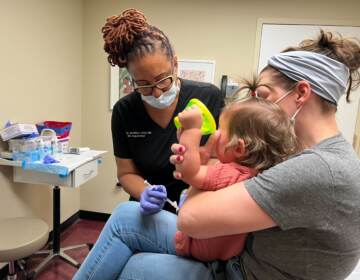Coronavirus update: Philly enters ‘rapid growth stage’ of pandemic; Pa.’s first death
Pennsylvania reported its first COVID-19-related death Wednesday, a person from Northampton County.

Philadelphia skyline (Emma Lee/WHYY)
Updated 10:06 a.m. Thursday
—
To date, there are 133 confirmed COVID-19 cases in Pennsylvania, 427 in New Jersey, and 25 cases total in Delaware.
Pennsylvania reported its first related death Wednesday, a person from Northampton County. New Jersey has recorded five deaths.
Today the @GovernorTomWolf Administration confirmed the state’s first #COVID19 related death, an adult from Northampton County. This individual was being treated at a hospital.
There is no additional information available about the patient at this time. pic.twitter.com/Cn1V1J1Alw
— PA Department of Health (@PAHealthDept) March 18, 2020
1-year-old boy infected in Montgomery County
Montgomery County says it’s transitioning to a “community spread” model for reporting positive COVID-19 cases as the number of infected individuals there rose by 8 since Tuesday to a total of 42.
That means health officials will no longer try to track where individuals may have contracted the disease, but rather assume people can pick it up from “normal activity,” said County Commissioners Chair Valerie Arkoosh.
Among the new cases is a 1-year-old boy from Royersford who is hospitalized, Arkoosh said, adding she didn’t know if he is in the hospital due to the severity of the illness or simply as a precaution.
Montgomery County accounts for nearly a third of the 133 cases reported statewide as of Wednesday.
Arkoosh also said the Board of Commissioners was moving ahead with its 10 a.m. Thursday meeting, but would screen visitors for a fever and deny entry to anyone with a temperature over 100.4 degrees.
Separately, a drive-through testing location could be opening in Upper Dublin Township soon, she said, although she wasn’t sure of timing and said priority would be given to testing first responders and other critical personnel.
“We will be releasing additional details as soon as they are confirmed,” she said. “I want to emphasize the site will not be open today.”
Penn State cancels in-person classes, postpones graduation
Penn State University on Wednesday canceled in-person classes for the rest of the spring semester, citing the coronavirus pandemic, as state officials announced a 40% jump in the number of confirmed cases.
Penn State, which enrolls about 100,000 students at some 20 campuses throughout the state, had previously planned to resume live classroom instruction on April 6, but said it needed to take more dramatic action “based on evolving federal guidance and statewide mitigation plans announced by Gov. Tom Wolf around the growing coronavirus pandemic.”
Cases confirmed in Pennsylvania exceeded 130 as of Wednesday, rising by 37, according to the state Department of Health. About two-thirds of confirmed cases have been in southeastern Pennsylvania. The majority of testing is now being done by private labs.
As it told students to remain home, Penn State also announced Wednesday that commencement will be postponed.
The university’s president, Eric J. Barron, said the school will honor its graduates in some form.
“Graduation is a significant milestone for our students and while it may not be the same as our traditional ceremony, we are committed to finding the best way possible to recognize the achievements of our graduates,” he said.
Officials said students will be told when they can return to pick up personal belongings inside campus residences. Exams will take place remotely.
The school says tens of thousands of students have already signed up for remote learning.
‘Rapid growth phase’ for virus in Philly
Philadelphia has entered what Health Commissioner Tom Farley called the “rapid growth stage” of the coronavirus pandemic, as the number of confirmed cases in the city rose by 16 since Tuesday to a total of 34.
“I expect that to continue,” he said of the increase at a Wednesday afternoon news briefing. Positive cases in the city have roughly doubled day after day since the weekend.
Farley also spoke about efforts taken by hospitals to free beds and expand the city’s COVID-19 testing capacity. He said a testing site near South Philadelphia’s sports complex could be coming “soon,” which would augment other medical centers already running tests.
“Yesterday, the providers that we spoke to in that group collected approximately 700 samples,” he said. “So, another sign we really are ramping up our testing efforts and capability.”
On the first full day of a nonessential business shutdown in Philly, City Commissioner Lisa Deeley said holding an in-person primary on April 28 would be “exceedingly difficult” and called on Gov. Tom Wolf to delay the election until late May or June.
Candidates for president, Congress and state legislative offices are due to appear on that ballot, among other races.
“We are preparing for various election eventualities from making an in-person election safe to ordering the necessary paper and envelopes to meet an increased demand for mail-in ballots,” Deeley said.
Officials confirmed that water, gas and electricity service would not be shut off to customers unable to make payments through at least May 1. Although many city agencies have rolled back operations, essential services remain open and the city has posted instructions on how to access them on its website.
For people looking for a way to help during the pandemic, Farley said the city’s Medical Reserve Corps could use volunteers with either clinical expertise or an interest in assisting with general tasks.
Pa., Del. and NJ experiencing unprecedented blood donation shortage during coronavirus
The American Red Cross is now facing a national shortage of blood donations due to widespread coronavirus concerns. In southeastern Pennsylvania, New Jersey, and Delaware, the last week has seen over 200 blood drive cancellations, resulting in 7,000 lost blood donations. School closures have deeply impacted this shortage, as colleges and high schools are among the top blood drive contributors, making up twenty percent of total donations.
“In this region alone, we need to collect 600 blood donations every single day just to meet the ongoing day-to-day needs of patients,” said Alana Mauger, who serves as the Penn-Jersey Region Manager of Blood Services.
Blood supply has many uses, including for patients who have sustained accidents and injuries and those in need of transplant surgeries. The Red Cross says one quarter of all blood donations go to cancer patients, who depend on blood to battle the disease.
“A lot of people are afraid to come out and they are listening to the social distancing guidelines and that’s really important,” Mauger said. “The good thing is that because we have trained staff and a blood drive is a regulated event, it’s not really considered a mass gathering.”
To ensure the safety of donors and medical staff, the American Red Cross is taking extra precautions. Every donor and staff member will have their temperature checked prior to entering the donor facility, and hand sanitizer is being made available throughout the procedure. In accordance with CDC-recommended social distancing standards, drive facilities are spacing out donor beds, and medical staff are increasing the disinfection of surfaces and medical equipment.
“I think what’s important to know is that part of being prepared for any kind of emergency or disaster or pandemic, part of that preparedness is making sure we have an adequate supply of blood for patients that need it,” Mauger said. “Blood can’t be manufactured… [patients] really rely on the generosity of blood donors.”
The American Red Cross Penn-Jersey Region will continue to add new appointment slots and extended hours for blood donations each day. Those interested in donating blood are encouraged to visit redcrossblood.org to call 1-800-REDCROSS.
Philadelphia police to limit arrests for nonviolent offenses
Even Philadelphia police officers making arrests must now abide by new social distancing guidelines to limit the spread of COVID-19 and prevent jail crowding.
Philadelphia Police Commissioner Danielle Outlaw said Wednesday that people who commit certain nonviolent offenses will be detained, identified and then issued a warrant to report later for processing.
Outlaw said whether to take people into custody will be up to the discretion of officers, who must weigh factors such as the severity of the alleged offense as well as the person’s criminal record, demeanor and potential danger to the community.
“The department is not turning a blind eye to crime,” Outlaw said, adding later: “No one will escape accountability for the crimes that they will commit.”
Clarification of PPD’s temporary response model in light of Covid-19 pic.twitter.com/8eMiUb17qD
— Danielle M. Outlaw (@PPDCommish) March 18, 2020
An internal PPD memo obtained by WHYY’s Billy Penn on Tuesday specified the crimes for which arrests would temporarily suspended, including drug offenses, theft and prostitution.
Outlaw on Wednesday slammed that leak for causing an “undue fear of panic and alarm during a time of crisis” and said arrests in all cases will be up to the discretion of officers.
She also said she’s not sure what impact the new guidelines will have on crime in the city.
“We are working through this the same way everyone else is,” she said. “This is unchartered. This is unprecedented. We’re going to deal with things as they come. And if something doesn’t work, we have to go back to the drawing board and figure out what does work.”
Grocery stores, retailers set aside special hours for older shoppers
Whole Foods, Giant-owned grocery stores, Target and other retailers are setting aside special hours for at-risk customers so they can shop in less crowded conditions and limit their potential exposure to people infected with COVID-19. Early research in China and elsewhere has found that being elderly or having another illness greatly increases the risk of dying from COVID-19.
Whole Foods and Giant stores, which include the Martin’s brand, for example, have set aside the first hour of every day for shoppers over 60.
Target, for its part, will reserve the first hour of operations each Wednesday to vulnerable populations, including elderly customers and those with underlying health concerns.
Stop and Shop and Dollar General have also announced special accommodations for those over 60.
If you’d like to know if other stores are doing something similar, call ahead or check online.
The Associated Press contributed reporting.
Correction: The story has been updated to reflect the person who died from COVID-19-related causes in Northampton County, and Montgomery County will deny entry to its Board of Commissioners meeting for anyone whose temperature is above 100.4 degrees.
WHYY is your source for fact-based, in-depth journalism and information. As a nonprofit organization, we rely on financial support from readers like you. Please give today.


![CoronavirusPandemic_1024x512[1]](https://whyy.org/wp-content/uploads/2020/03/CoronavirusPandemic_1024x5121-300x150.jpg)



